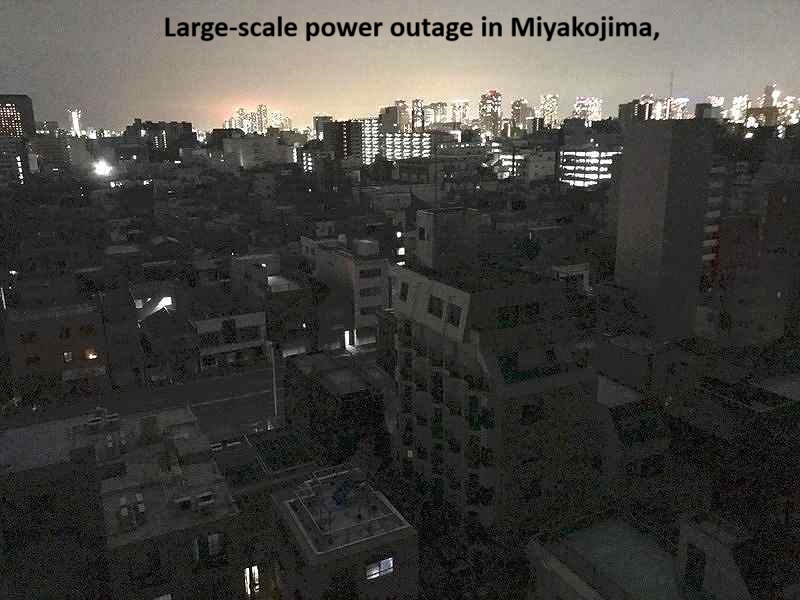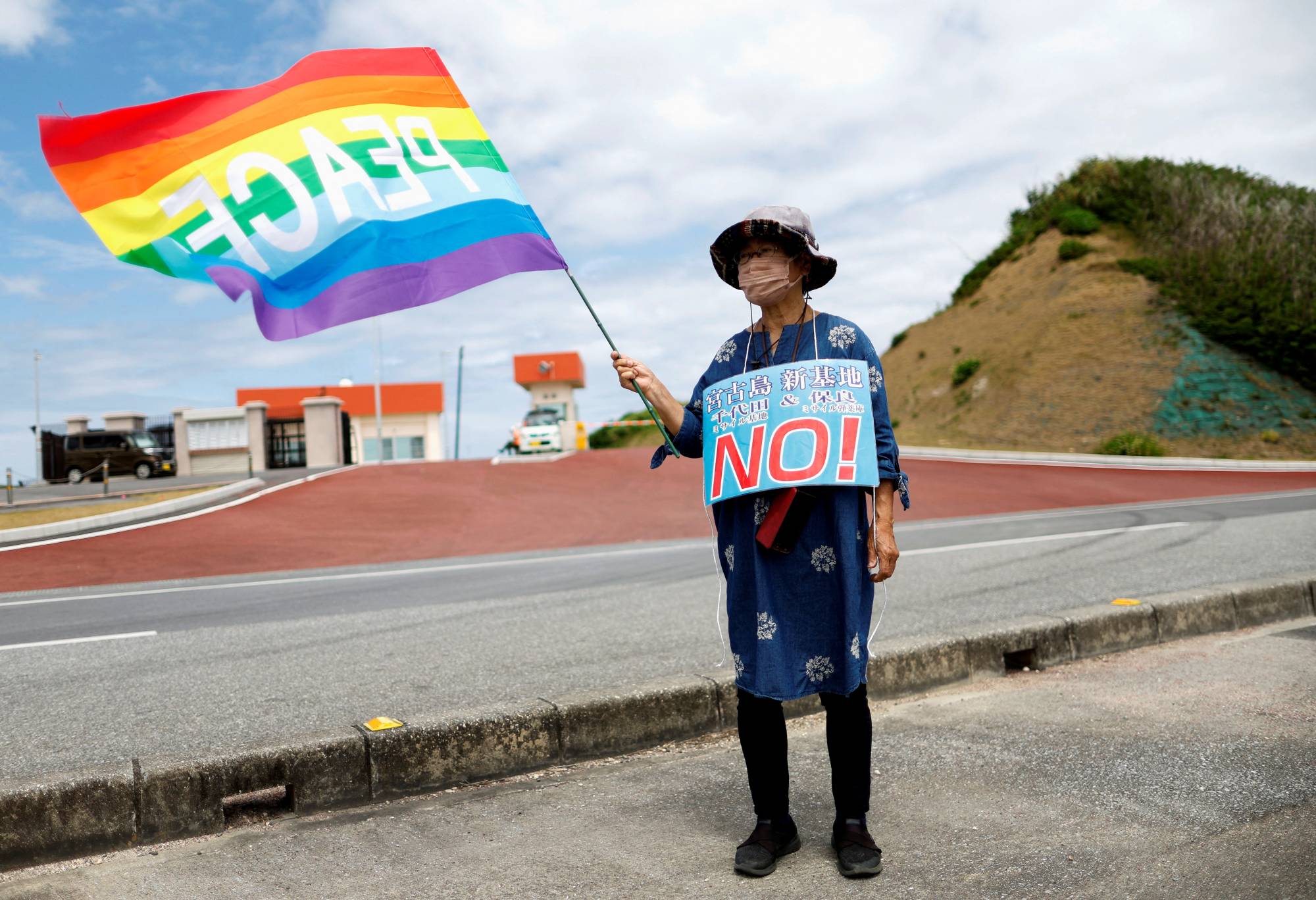Around 3:10 a.m. on the 25th, Miyakojima City in Okinawa Prefecture experienced a large-scale power outage. As of 9:30 a.m. on the same day, Okinawa Electric Power reported that approximately 25,500 households, nearly all households in the city, remained without power. There is currently no estimated time for restoration.
Miyakojima City receives its electricity from local power plants within the city itself. Okinawa Electric Power has reported that although power was temporarily restored in some areas, subsequent outages occurred. While there are no issues with the generators themselves, the exact cause of the ongoing outages is currently under investigation.

As a consequence of the power outage in Miyakojima City, Miyako Prefectural Hospital announced on the same day the closure of its outpatient clinics. However, the hospital will continue to accept emergency patients. Fortunately, emergency power systems were activated after the outage, ensuring that hospitalized patients were not affected.
A large-scale power outage that affected Miyakojima City in Okinawa has now been restored throughout the area. The cause of the outage is currently under investigation.
Around 3:10 a.m. on the 25th, Miyakojima City in Okinawa Prefecture experienced a widespread power outage affecting approximately 25,500 households, nearly all homes in the city. Okinawa Electric Power reported that power was restored across the entire area around 11:40 a.m., approximately eight and a half hours later.

Miyakojima City sources its electricity from local power plants. Okinawa Electric Power confirmed that the generators were functioning normally, and they are currently investigating the cause of the outage. Consequently, Miyako Prefectural Hospital made an announcement on the same day to close its outpatient clinics and only admit emergency patients. Despite the power outage, emergency power systems were activated, ensuring that hospitalized patients did not experience any disruptions. [Masanori Hirakawa]
The Ministry of the Environment conducted a survey revealing that 74% of respondents were unaware of “Deco-katsu,” a nationwide initiative aimed at promoting energy conservation.
On the 22nd, the Ministry of the Environment disclosed results from a survey on “Deco-katsu,” a national campaign promoting energy conservation and other efforts for a decarbonized society. The survey found that 74% of respondents either indicated they had “never heard of it” or “didn’t understand” it. Only 3% reported actively “practicing” the initiatives. The Ministry aims to enhance awareness and highlight the initiative’s benefits and importance. “Deco-katsu” combines “decarbonization” and “eco” in its name, signifying its environmental focus.
Due to intense heat and rising electricity costs, a major air conditioning company has investigated that 60% of energy-saving measures for air conditioners are “misunderstood.”
This summer, amid intense heat and rising electricity costs affecting households directly, Daikin Industries, a major air conditioning company, conducted a survey to investigate energy-saving practices for air conditioners. The survey revealed that 60% of respondents had misunderstandings about how to save electricity. These “misguided power-saving techniques” refer to actions people believe are beneficial but actually increase power consumption. The survey, conducted via smartphones in mid-June, included 527 men and women aged 20 to 59 nationwide. The most common misconception, cited by 26% of respondents, was “setting the air conditioner to the lowest possible air volume.”
What to do if the power goes out? Preparation in advance
Preparing in advance for a power outage is crucial to ensure safety and comfort during emergencies. Here are some recommended steps and items to have ready:
Things to Prepare in Advance:
- Flashlights and Footlights:
- Flashlights: Keep flashlights in easily accessible places in case of nighttime outages. Consider headlamps for hands-free use.
- Footlights: Install automatic footlights that turn on during power outages to prevent accidents.
- Spare Batteries and Portable Radio:
- Spare Batteries: Have extra batteries for flashlights and other essential devices.
- Portable Radio: A battery-powered or hand-crank radio is essential for staying informed with emergency broadcasts and updates.
- Cassette Stove:
- Alternative Cooking: Prepare a cassette stove for cooking if your usual cooking appliances, like IH heaters, become unusable during power outages.
- Safety Note: Use appropriate caution with cassette stoves to prevent overheating and accidents.
- Drinking Water:
- Water Supply: Store at least a three-day supply of drinking water (3 liters per person per day).
- Additional Water: Fill your bathtub with water for non-drinking purposes such as sanitation and washing dishes in case of water supply disruptions.
- Emergency Supplies for Medical Needs:
- Medical Equipment: If you rely on electric-powered medical equipment like ventilators, ensure you have spare batteries or a generator ready.
Additional Tips During a Power Outage:
- Stay Informed: Keep updated with local news and emergency information using your portable radio or a charged smartphone.
- Temperature Management: During extreme weather, use blankets or open windows for ventilation to regulate indoor temperature.
- Food Safety: Consume perishable food items first and have non-perishable foods available.
- Neighbor Check: Check on neighbors, especially elderly or vulnerable individuals, to ensure their safety.
By preparing in advance with these essentials and knowing what to do during a power outage, you can effectively manage unexpected situations and ensure the well-being of yourself and your family.
Things to Be Careful About During Power Outages:
During a power outage, it’s essential to be cautious and mindful of potential risks. Here are important precautions to take:
- Avoid Open Flames:
- Candles: Do not use candles or open flames indoors for illumination. They pose a fire hazard, especially when combined with scattered objects during an earthquake. Use long-lasting LED flashlights instead.
- Turn Off Power Supply and Breaker:
- Electrification Fires: To prevent “electrification fires,” turn off electrical appliances and unplug them from outlets during a power outage. Also, switch off the main breaker to cut off electricity completely before leaving your home or when evacuating to an evacuation center.
- After Restoration: When power is restored, if you detect smoke or unusual smells from electrical equipment, immediately turn off the breaker and contact the fire department.
- Use of Private Generators:
- Indoor Use: Never operate a private generator indoors due to the risk of carbon monoxide poisoning. Generators should only be used outdoors and placed in well-ventilated areas away from living spaces, vehicles, or tents.
Additional Safety Tips:
- Emergency Lighting: Ensure you have multiple LED flashlights or headlamps with fresh batteries readily available.
- Communication: Keep a charged mobile phone or a battery-powered radio for emergency updates and communication.
- Food Safety: Minimize opening refrigerators or freezers to keep perishable foods cold for as long as possible.
- Neighbor Check: Look out for neighbors, especially those who may need assistance during power outages.
By following these precautions and staying informed, you can help ensure the safety of yourself and your household during power disruptions.
Things to Be Careful About During Summer Power Outages:
During summer power outages, heat stroke becomes a concern. Here are some precautions:
- Ventilation: Open windows to improve airflow and ventilation indoors.
- Hydration: Keep drinking water, oral rehydration solutions, and salt on hand. Stay hydrated by drinking fluids regularly, even if you do not feel thirsty.
- Cooling Measures: Use ice packs, ice, or damp towels to cool your body. Focus on areas like the neck, armpits, and feet to effectively lower body temperature.
Things to Be Careful About During Winter Power Outages:
In winter, loss of heating can lead to cold-related risks. Take the following steps to stay warm:
- Winter Clothing: Have warm clothing such as sweaters, gloves, hats, and thick socks readily available.
- Blankets: Keep blankets handy to stay warm.
- Disposable Warmers: Use disposable warmers to provide additional heat.
- Aluminum Thermal Sheet: Utilize aluminum thermal sheets to retain body heat.
- Portable Stoves: Prepare non-electric portable stoves like oil-type or cassette cylinder-type stoves for heating and cooking.
These preparations will help you manage during power outages in both summer and winter, ensuring safety and comfort for you and your household.
